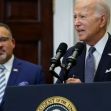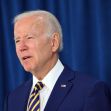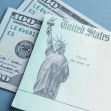President Biden unveiled his plan of loan forgiveness through a press conference and a Fact Sheet statement earlier last week. For many, his announcement is long overdue but for others, the anticipated student debt relief brings with it economic concerns and questions about fairness.
President Biden outlined that he plans to forgive $10,000 in federal student loans for borrowers who make up to $125,000 and couples who make up to $250,000. For borrowers who were recipients of Pell Grants, grants designated for low-income students, borrowers can expect loan forgiveness of $20,000, granted that they still meet the income threshold.
A vast majority of student loans are borrowed from the federal government, with about 92% of all student debt falling under this category. Nationally, the student debt total owed by borrowers of both private and federal loans totals $1.75 trillion. Estimates detail that Biden's plan to help alleviate the burden of student loan debt will cost roughly $554 billion over the next 10 years.
Who Stands to Benefit the Most from Student Debt Relief?
One of the biggest points of contention with Biden's announcement of forgiving student loan debt has been the clarity of who stands to benefit the most.
Proponents of Biden's announcement, especially progressive democrats, have touted the narrative that student loan relief will help borrowers who have been burdened with debt to the point that it's paralyzed them from purchasing a home, starting families, and advancing in life.
Natalia Abrams, president of the Student Debt Crisis Center, explains that “Broad-based student debt cancellation will free millions of Americans to invest in their futures, support their families, and contribute to their communities and the economy.”
While this sentiment is shared by many others who are in support of Biden’s plan for debt relief, the data isn’t as agreeable.
According to a detailed review done by the University of Pennsylvania’s Wharton School, compiled data points to a much more muted picture of who stands to benefit the most from student debt relief.
A majority of Americans do not stand to be helped by the sweeping student debt relief. Pew Research outlines that as of 2021, 37.9% of Americans age 25 and older hold a bachelor's degree. Of this percentage, just over 14% hold a graduate degree. For many Americans, student debt is not the main factor standing in the way of their prosperity.
The Wharton analysis further outlines that 48% of all indebted federal borrowers are ages 18 to 34, and individuals aged 18 to 49 account for 80% of borrowers. While many of these borrowers are in their prime home-buying years, they still do not represent a majority of Americans.
Conversely, it's not individuals who hold graduate degrees who are the ones struggling to pay off their college debt, as they will typically enter high-paying career fields and will be able to pay off their debt over time.
According to the Washington Post, it is the 13% of borrowers who owe less than $20,000 in student loans who are burdened with paying that debt off. Despite having a much lower balance, they typically struggle with paying off the loan. The reasons are many, including the inability to complete the degree and obtain a job that will allow them to pay their debt off. Still, this percentage accounts for a sliver of Americans.
Some Democratic leaders including Bernie Sanders and Elizabeth Warren have urged the administration to go beyond $10,000 in debt relief. The NAACP has echoed a similar sentiment with NAACP President Derrick Johnson sharing, “We’ve got a ways to go, but the NAACP is proud that we were able to push President Biden to exceed $10,000, bringing us closer to $50,000 and beyond.”
Critics, Economists, and Others Question Future Ramifications
Distribution of funds and whether or not Biden's proposed debt relief plan will actually target those who need the help the most is the main focus of criticism by individuals opposed to the plan.
Despite being well-intentioned, Biden's plan has drawn criticism from many democrats who raised concerns about potential economic ramifications. Democratic economist Jason Furman, who served as chairman of the Council of Economic Advisers under former President Barack Obama, has vocalized his concern about this massive use of federal dollars on a small segment of the U.S. population. Furman criticized the president's move tweeting, "pouring roughly half trillion dollars of gasoline on the inflationary fire that is already burning is reckless."
Aside from being a hotly contested economic move, taxpayers throughout the nation have expressed their frustration about the overall fairness of the move. Many borrowers who took out loans and paid their loans off have expressed frustration and even anger about footing the bill for someone else's decision to take out a loan that they could not afford to pay back.
Many other Americans who decided to forego college because of the cost or made other life-altering decisions because they did not take out a loan have criticized the president's decision to offer sweeping forgiveness for individuals who knowingly signed up for a loan that they promised to pay back.
As the debate between whether or not Biden's move is economically sound or downright fair, the conversation has now begun to shift toward whether or not the president's move is actually legal. In the coming months, the administration is expected to brace for lawsuits and other legal challenges against the sweeping debt relief.






